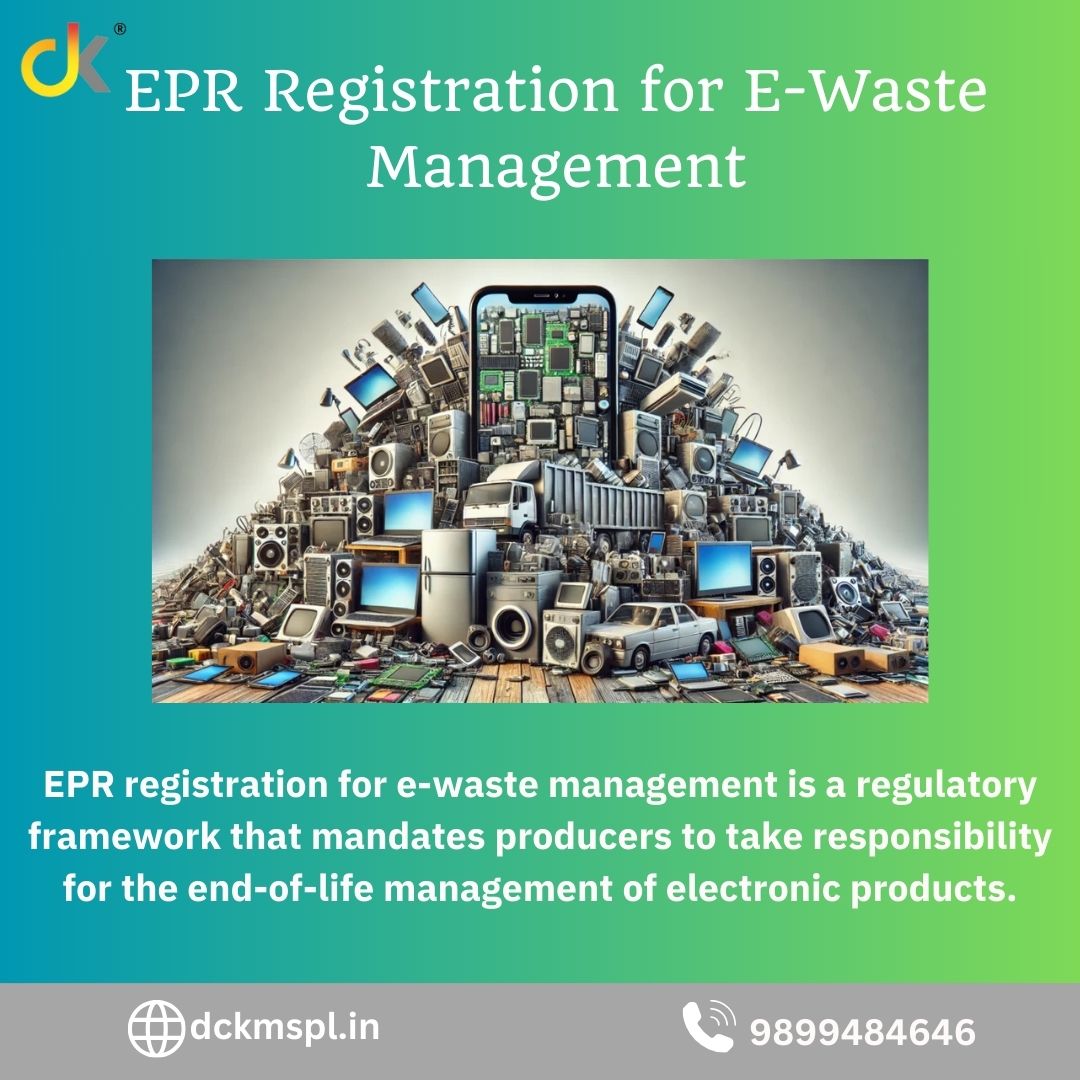In the modern era, where electronic devices dominate daily life, the rise in electronic waste (e-waste) has become a significant environmental challenge. To address this issue, the concept of Extended Producer Responsibility (EPR) has been introduced, emphasizing sustainable waste management practices. EPR registration is a crucial step for businesses involved in manufacturing, importing, or selling electronic products to ensure compliance with e-waste management rules and regulations.This article delves into the significance of EPR registration, its process, benefits, challenges, and its role in fostering a sustainable environment.
Understanding EPR in E-Waste Management
EPR registration for e-waste management is a policy approach that assigns producers the responsibility for managing the lifecycle of their products, including disposal. In the context of e-waste, it mandates that producers collect, recycle, and dispose of e-waste in an environmentally sound manner. This shifts the responsibility of waste management from consumers to manufacturers, ensuring a structured and efficient process.EPR registration serves as a formal acknowledgment by the regulatory authorities that a producer or brand owner has committed to adhering to e-waste management guidelines.
Significance of EPR Registration
- Environmental Protection
EPR registration ensures that electronic waste is recycled or disposed of responsibly, reducing harmful effects on the environment and preventing toxic substances from contaminating soil and water. - Compliance with Regulations
Governments worldwide have implemented stringent laws to manage e-waste. In India, the E-Waste (Management) Rules, 2016, mandate EPR registration for all producers. Non-compliance can result in heavy penalties. - Promotes Circular Economy
Through EPR, electronic components are recycled, reused, or repurposed, contributing to a circular economy. This reduces the need for virgin resources and minimizes waste generation. - Corporate Social Responsibility (CSR)
Companies that adhere to EPR guidelines demonstrate their commitment to sustainability, enhancing their brand image and gaining consumer trust.
The EPR Registration Process
Step 1: Understanding Applicability
EPR registration applies to manufacturers, importers, brand owners, and producers of electronic goods. Companies must determine if their products fall under the scope of e-waste management rules.
Step 2: Preparation of Documents
Applicants need to compile necessary documents, such as:
- Proof of business registration
- Product details and quantity
- E-waste management plan
- Agreement with an authorized e-waste recycler or Producer Responsibility Organization (PRO)
Step 3: Submission of Application
Applications must be submitted online to the concerned authority, such as the Central Pollution Control Board (CPCB) in India.
Step 4: Approval and Compliance
Upon review and approval of the application, the company receives EPR authorization. The company must then implement the e-waste collection and recycling plan as per the approved guidelines.
Benefits of EPR Registration for E-Waste Management
- Regulatory Compliance
Registered companies can operate without the risk of legal penalties, ensuring smooth business operations. - Enhanced Brand Image
Companies committed to sustainable practices often gain public trust and loyalty, which can lead to increased sales and market share. - Environmental Benefits
EPR ensures the safe recycling of hazardous materials, reducing environmental pollution and conserving natural resources. - Cost Savings in the Long Term
Efficient e-waste management reduces waste disposal costs, and recycled materials can be used in manufacturing new products, lowering production costs. - Global Market Access
Many countries have strict import regulations regarding e-waste. EPR compliance ensures seamless access to international markets.
Challenges in EPR Implementation
While EPR registration is a step towards sustainability, it comes with its challenges:
- High Initial Costs
Setting up an e-waste management system and partnering with recyclers can be expensive for small and medium enterprises (SMEs). - Awareness and Education
Many producers are unaware of EPR requirements or the importance of e-waste management, leading to non-compliance. - Fragmented Recycling Infrastructure
In developing countries, the lack of organized recycling facilities and skilled workforce hinders effective e-waste management. - Enforcement Issues
Monitoring compliance and penalizing defaulters can be challenging for regulatory authorities. - Consumer Participation
E-waste collection relies heavily on consumers returning discarded electronics, which requires awareness and incentives.
How to Overcome These Challenges
- Government Support
Subsidies or financial incentives for SMEs can help offset the costs of setting up e-waste management systems. - Public Awareness Campaigns
Educational initiatives about the importance of e-waste recycling can motivate consumers to participate actively. - Strengthening Infrastructure
Investment in state-of-the-art recycling facilities and training programs for workers can enhance the efficiency of e-waste management. - Collaborative Models
Companies can collaborate with PROs, which take on the responsibility of managing e-waste on their behalf.
The Role of EPR in a Sustainable Future
EPR registration is not just a regulatory requirement but a significant step towards achieving sustainability. As e-waste continues to grow, the importance of structured management systems cannot be overstated. By adhering to EPR guidelines, producers play a crucial role in mitigating environmental damage, conserving resources, and fostering innovation in recycling technologies.The global push towards sustainability has made EPR an essential component of business operations, particularly in the electronics industry. Companies that embrace these practices not only contribute to environmental conservation but also position themselves as leaders in corporate responsibility.
Conclusion
EPR registration for e-waste management is a transformative initiative that addresses one of the most pressing environmental issues of our time. By ensuring compliance with e-waste rules, companies can reduce their ecological footprint, enhance their market reputation, and contribute to a sustainable future.While challenges exist, collaborative efforts between governments, businesses, and consumers can overcome these obstacles, paving the way for a cleaner, greener world. For producers, EPR registration is not merely a legal obligation; it is an opportunity to lead by example and drive positive change in the industry and society.
